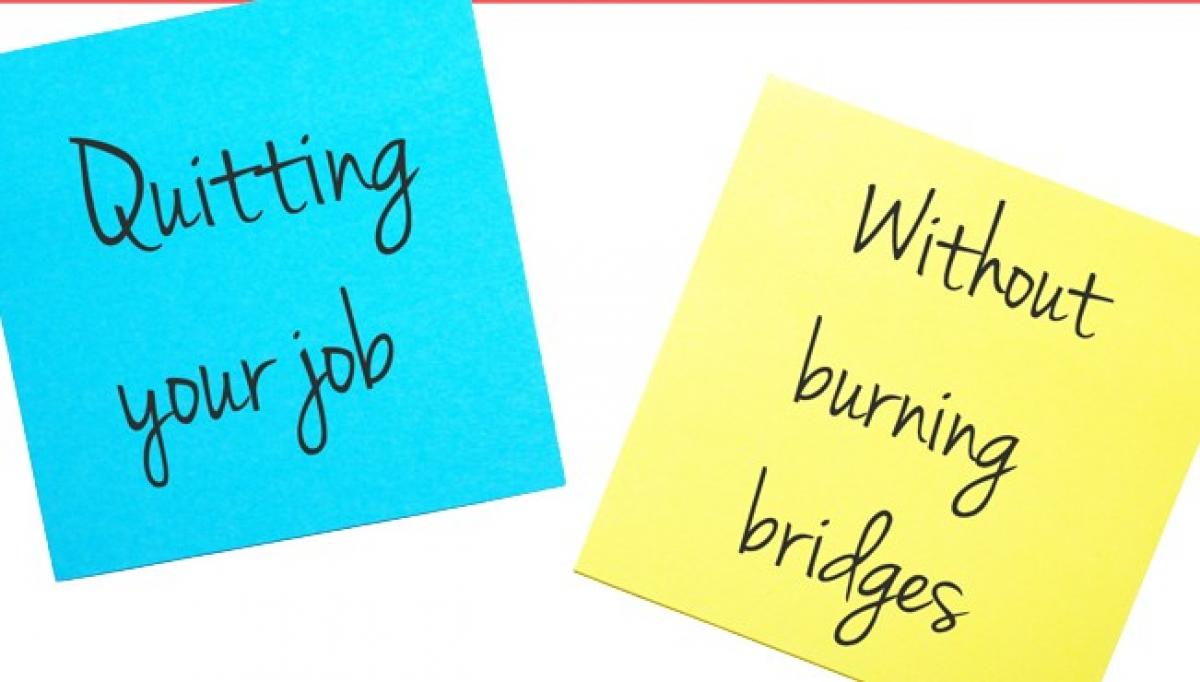Plan on quitting your job? Here’s how to do it right

You might have had the worst time of your life working at a company or under a certain boss, but do not give in to the temptation of washing your dirty linen in public. You have your whole career ahead of you, and you need to be diplomatic to survive the storm.
Remember Steven Slater? For those of you who don’t, he was a flight attendant with the American low-cost airline, JetBlue, who made a dramatic exit from the plane, and his job, after swearing at passengers, grabbing two cans of beer and sliding down the inflatable evacuation slide. He managed to escape a prison sentence by pleading guilty and agreeing to undergo counselling. Slater might have become a social media celeb, but he became one for all the wrong reasons. Although a few empathised with him and supported him for the way he chose to bid goodbye to his job, that impulsive decision left him poorer and on the black list of potential employers. However bad, stressful or depressing your job may be or however cruel, insensitive or nosy your boss maybe, it helps to maintain a certain level of decency while leaving a job. Quitting a job gracefully is not just about avoiding burning bridges with your employer; it also has a huge impact on the future of your career.
So however tempted you may be to deliver the ‘these fish have manners and they are coming with me’ speech from Jerry Maguire, here are a few tips that will ensure that you stay on track and leave your job with your reputation intact.
Inform your boss in person
Office protocol may require you to send out an official resignation letter, but take a few minutes to meet your boss in person and speak to him/her about your decision. The earlier you initiate this meeting, the better. Keep the conversation short and professional. Do not let your emotions run overboard, and refrain from cribbing and complaining. The first question you will be asked is: “Why?” Be honest and word your answers in the best possible way. Instead of saying something like “I got a much better job that pays twice as much”, be gracious and say something like “I have an offer which I think is a good next step for me.” Remember that your boss may need to give you a reference for a future job. So it is best not to burn bridges.
Give adequate notice
Most companies require that you give them at least three weeks’ notice before you quit your job. It is best to give your seniors enough time to mitigate your loss and find a replacement. Doing this shows that you are professional and that you appreciate the importance of your role in the company. Moreover, it shows that you would like to maintain a positive relationship with the company even after moving on. Some offices may ask you to leave earlier than you expected to. However, show them courtesy by giving the required notice.
Make the transition smooth
Finish off as many of your tasks as you possibly can before you leave, and if possible, leave instructions for the person filling in for you. If you manage a team, give them proper instructions as to what is expected of them even in your absence. Have a discussion with your boss on how to handle important and confidential details like passwords or codes and whom to pass it on to. If your successor takes charge before you leave, train him/her to help make the transition smooth. Again, all this reflects your professionalism.
Ask for an exit interview
An exit interview is the HR’s way of ascertaining why talent leave their company and uncovering areas where the company or the top management needs improvement. This is where you can air the opinions that you left out of your resignation letter and your personal conversation with your boss. If the company does not offer an exit interview, you could always request for one. Here, too, be honest but not rude. Make your points, but keep the discussion constructive. Don’t complain or speak harshly, but don’t be afraid to talk about your fundamental concerns regarding the company and your job.
Keep in touch with your colleagues and clients
Make it a point to meet individually with mentors within the company and let them personally know that you are leaving. Send a farewell email to your co-workers and let them know where you are going and how you can be reached. Insist that you all keep in touch. In any case, you are likely to run into each other if you plan on continuing in the same industry. It may also help to inform clients and others you were working with outside your company of your departure from the organisation.
You might have had the worst time of your life working at a company or under a certain boss, but do not give in to the temptation of washing your dirty linen in public. You have your whole career ahead of you, and you need to be diplomatic to survive the storm.
Source: TechGig














